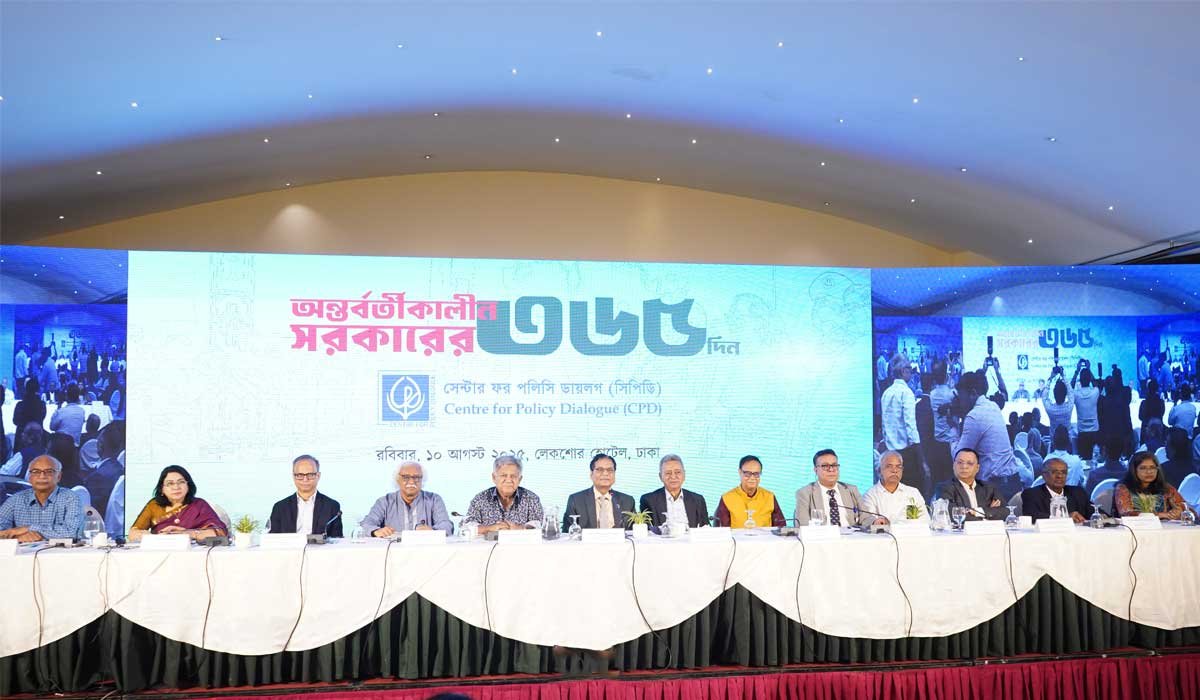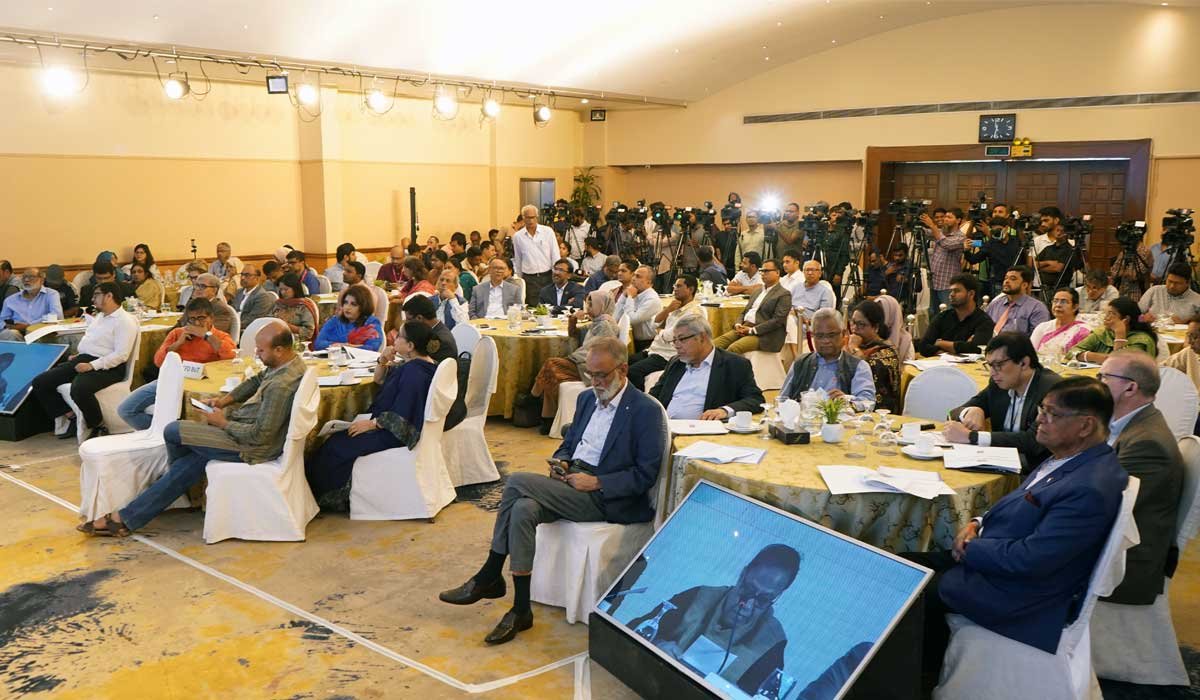
As Bangladesh’s interim government approaches the final phase of its tenure, it is crucial to focus on strengthening economic stability and ensuring a smooth transition after the upcoming elections. While progress has been made over the past year, challenges such as high inflation, weak private investment, fragile banking governance, and export vulnerabilities persist. Immediate action on targeted relief for low-income households, accelerated banking sector reforms, and safeguarding the independence of key economic institutions will be key to preserving recent gains.
These priorities were discussed at the dialogue titled ‘365 Days of the Interim Government’, organised by the Centre for Policy Dialogue (CPD) on Sunday, 10 August 2025, at the Lakeshore Hotel, Dhaka.
One of the critical issues raised was the inefficiency of the police structure, attributed to political interference. Brigadier General (R.) Dr M. Sakhawat Hussain, Hon’ble Adviser to the Ministry of Labour and Employment, stressed that without substantial reforms, the police will remain unable to serve the public effectively. He also highlighted the garment industry’s struggles, with worker protests and factory shutdowns exacerbating the crisis. Urgent solutions beyond discussions were called for to stabilise the sector.

Dr Fahmida Khatun, Executive Director of CPD, highlighted the economic challenges the interim government inherited, including slow growth and deep-rooted governance failures in the banking sector. She acknowledged the steps taken over the past year to stabilise the economy but emphasised that it is now vital to build on these gains. Professor Mustafizur Rahman, Distinguished Fellow at CPD, added that long-term planning is essential to safeguarding the progress achieved, ensuring that reforms continue seamlessly after the elections.
In his remarks as special guest, Mr Amir Khosru Mahmud Chowdhury, former Commerce Minister and BNP Standing Committee member, raised concerns about the country’s investment climate. He pointed out that Bangladesh’s regulatory environment is overly restrictive, particularly for investors. He emphasised the need for serious deregulation to improve the ease of doing business, which currently ranks near the bottom globally. Further, he recommended reducing government involvement in business matters, citing his experience with the garment sector. There, transferring export certification processes to trade bodies significantly reduced government interference and corruption.
Addressing Bangladesh’s financial sector, Dr Ahsan H. Mansur, Governor of Bangladesh Bank, spoke about the need for macroeconomic stabilisation and continued reforms. He acknowledged efforts by the central bank to stabilise the exchange rate and prevent cuts to credit lines, while stressing the importance of addressing the government’s revenue shortfall and reforming the banking sector, including changes to the Bank Company Act. Financial inclusion, support for distressed assets, and promoting digital transactions were also highlighted as key to ensuring long-term economic resilience.
Mr Ruhin Hossain Prince, General Secretary of the Communist Party of Bangladesh (CPB), expressed concern over the unrest that has characterised the past year, unsettling both the public and business community. He pointed out that economic corruption must be addressed to achieve lasting peace, particularly for marginalised groups such as minorities, women, and the disabled. Mr Prince also criticised inconsistent policies, especially around economic zones, and called for more stable, long-term policies that would support business growth. He also voiced concerns over the misuse of funds in government programmes like the Skill of Industries Competitiveness and Innovation Programme (SICIP).
The dialogue also explored measures taken over the past year to control inflation, enforce fiscal discipline, and strengthen banking sector oversight. However, CPD warned that without export diversification, stronger social protection measures, and safeguards against political interference, Bangladesh’s economy could face renewed instability post-elections.

The education sector’s centralisation was questioned by Professor ASM Amanullah, Vice Chancellor of National University Bangladesh. He criticised the outdated syllabus and centralised control of higher education, which he argued is unsustainable. Despite these shortcomings, National University graduates are in demand, but often for their adaptability rather than their skills, he pointed out.
While discussing the issues in the energy sector, Dr M Tamim, Vice Chancellor of Independent University Bangladesh (IUB), highlighted the country’s energy security challenges. He criticised the government for its failure to implement long-term solutions, noting the repeal of the Rapid Power Supply Act of 2010, which had initially been successful. Despite clearing significant debt in the energy sector, the country still faces ongoing issues with subsidies, gas shortages, and a lack of review of key energy contracts.
Concerns regarding banking sector inefficiency were raised by Mr Mahmud Hasan Khan (Babu), President of the Bangladesh Garment Manufacturers and Exporters Association (BGMEA). He spoke about the concentration of ownership in multiple banks and the disruptions caused by mergers, which have negatively impacted factory operations. He called for more predictable policies, particularly in the banking and energy sectors, to attract investment.
Mr Syed Sultan Uddin Ahmed, Chair of the Labor Reform Commission, highlighted Bangladesh’s lack of preparedness for LDC graduation, particularly in labour standards and skills development. He called for better coordination between industries, ministries, and academic institutions to support workforce development, as well as better protection for migrant workers and improved access to education and healthcare for those in labour-intensive sectors.
A significant issue raised was the rise in Non-Performing Loans (NPLs), with Mr Mohammed Nurul Amin citing an increase from BDT 22,000 crore in 2009 to BDT 530,000 crore last year. While he acknowledged improvements in transparency and reduced political interference, he stressed the need for further efforts to enhance accountability and regulatory efficiency in Bangladesh Bank.
Mr Showkat Aziz Russell, President of the Bangladesh Textile Mills Association (BTMA), added his voice to the call for banking sector reforms, criticising the large number of small banks with flawed management. He recommended merging or closing down underperforming banks to allow stronger institutions to grow.
Ms Jimi Amir, Member of the Media Reform Commission, shed light on the challenges faced by journalists, particularly in district areas where many work without pay. She stressed the need for government support to improve journalists’ financial security and to enhance accountability in the media sector.

The event concluded with a focus on key sectors such as textiles, banking, and the media, as well as the rise of AI and its regulation. High-level policymakers, business leaders, civil society members, academics, and journalists participated, providing valuable insights into how the interim government can address these challenges while preparing for a stable transition.


